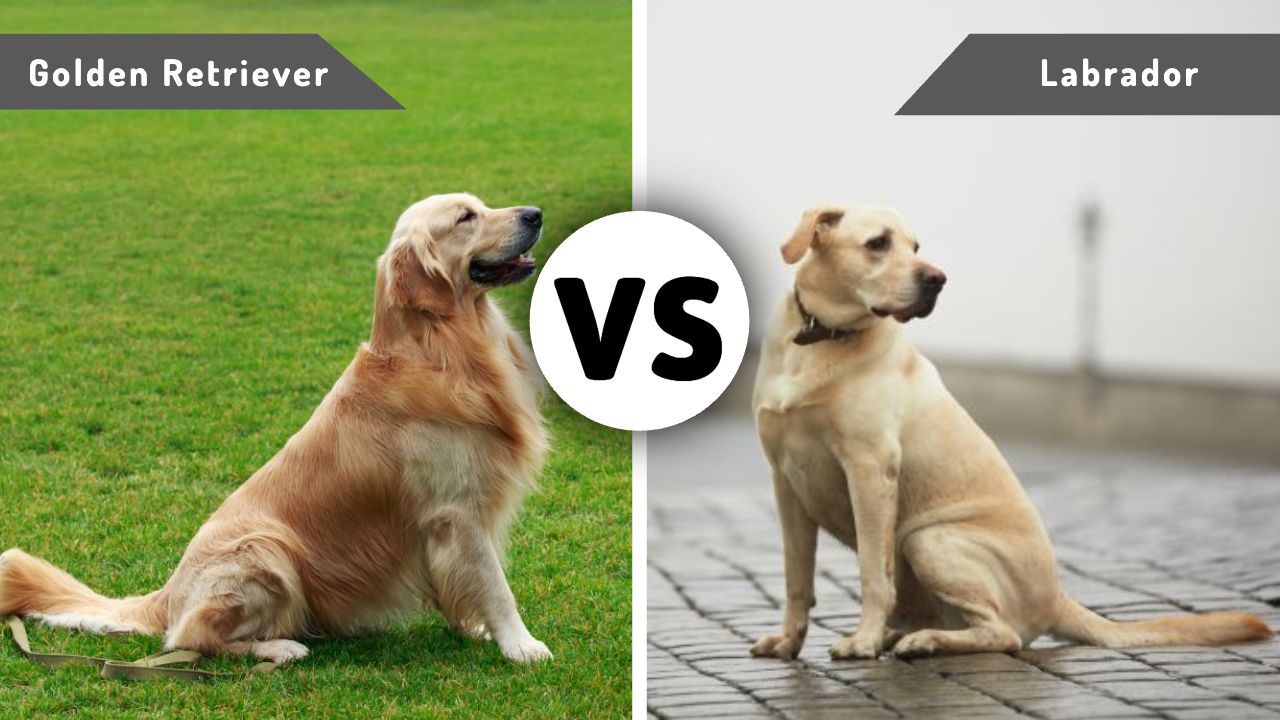
Two of the most popular dog breeds in the United States, the Golden Retriever and the Labrador Retriever, are often compared.
Both Goldens and Labs have a lot in common. Not only are they both intelligent, friendly, and good with children, but they also look very similar, and there’s probably a time when you scroll through your social media feed and see a picture of a dog that you can’t tell is a Golden or Lab. In fact, many people often ask if the Golden Retriever is a Labrador.
So, what’s the difference between these breeds? And more importantly, which one should you get? This article will compare the two side-by-side, so you can make a more informed decision about which one is right for you.
| BREED COMPARISON | ||
|---|---|---|
| Golden Retriever | Labrador Retriever | |
| Weight | 55 to 75 pounds | 55 to 80 pounds |
| Height | 21 to 24 inches | 21.5 to 24.5 inches |
| Size | Medium-sized dogs | Medium-sized dogs |
| Temperament | Gentle, Friendly, Intelligent | Outgoing, Friendly, Intelligent |
| Trainability | 5.0 out of 5.0 stars5.0 | 5.0 out of 5.0 stars5.0 |
| Energy Level | 4.0 out of 5.0 stars4.0 | 5.0 out of 5.0 stars5.0 |
| Life Expectancy | 10-12 years | 11-13 years |
| Shedding | Moderate | Moderate |
| Hypoallergenic | No | No |
| Puppy Costs | $1,000 to $5,000 | $1,000 to $2,500 |
| Suitable For | Golden Retrievers are suitable for people looking for an active and friendly companion. They have a lot of energy, love being outdoors, and enjoy spending time with their families. They are also intelligent, loving, and gentle, making them great for families with young kids. | Labrador Retrievers are also an excellent choice for families and individuals looking for an active, friendly companion. They, too, have a lot of energy and love being outdoors. But they are more energetic than Golden Retrievers and have an outgoing personality, which is better suited for someone who lives an active lifestyle. |
Breed History & Origin
The Golden Retriever is a Scottish breed originally bred as gun dogs to retrieve waterfowl during hunting expeditions. They were developed in the 19th century by Lord Tweedmouth from a cross between a yellow Wavy-Coated Retriever and a Tweed Water Spaniel. Recognized by the AKC in 1925, the Golden Retriever is one of America’s favorite dog breeds.
The Labrador Retriever is a Canadian breed developed in the 1500s and is a cross between small water dogs and Newfoundlands. Initially bred to help fishermen haul nets and retrieve fish from the cold waters, they were brought to England in the early 1800s and became popular with the hunters. The Lab was recognized by the AKC in 1917 and ranked first in popularity in the United States since 1991, making a record-breaking run as the most popular breed for over three decades.
Appearance
Golden Retrievers and Labrador Retrievers look very similar. They are both medium-sized dog breeds, with the Lab slightly larger and heavier than the Golden. The Lab stands at 21.5 to 24.5 inches tall and weighs 55 to 80 pounds, while the Golden Retriever is 21 to 24 inches tall and weighs 55 to 75 pounds.
The most notable difference in appearance between these two breeds is their coat. The Labrador Retriever has a short, dense, water-resistant double coat available in three colors: black, chocolate, and yellow. You may also find silver, red, and white Labs, but the AKC does not recognize them.
The Golden Retriever, in contrast, has a long, water-repellent double coat. And they look softer and fluffier than Labs and can come in standard classic gold, cream, light golden, dark golden, and red.
Another obvious difference between these two breeds is their tails. The Labrador Retriever has a thick, pointy, rounded tail that is often described as an “otter tail” because it is similar to that of otters’. On the other hand, the Golden Retriever has a fluffy, feathery tail and is often carried merrily over their backs.
Temperament
There’s a reason the Golden Retriever and the Labrador Retriever are among the most popular dog breeds in the United States. Both are gentle, loving dogs that make great family pets. They are good with children and get along well with people and other pets. There is only very little difference when comparing the temperament of these two breeds.
The Golden Retriever is slightly more laid-back and easy-going than the Lab. They are less active and have an overall calmer demeanor. They love to stick to their family, whether going on walks or just cuddling on the couch. That doesn’t mean they don’t need exercise, though. They still need plenty to stay happy and healthy, including daily walks and additional playtime in the yard or at the park.
Labrador Retrievers are known for being eager, enthusiastic dogs with lots of energy. They are more outgoing and more active than their Golden cousins and will require more exercise every day. While they are also kind and friendly dogs, they aren’t as patient and are more rambunctious.
Exercise Needs
Both are bred as hunting and working dogs, so it’s no surprise that the Golden Retriever and the Labrador Retriever have high exercise needs. If not given enough, they may start to exhibit destructive behavior.
Labs, in particular, are easily bored and restless because of their high energy levels and outgoing personalities. They require at least an hour and a half to two hours of exercise daily. They love swimming, playing frisbee, and enjoy hiking, jogging, running alongside a bike, and participating in agility courses.
Goldens have slightly lesser exercise needs. They generally need an hour of exercise daily, though they’ll happily take more if you’re up for it. This can be in a combination of walks, runs, swimming, playing fetch, and anything else that will get them moving.
And as with any dog, both breeds need mental stimulation. So be sure to provide them with plenty of toys, interactive games, and puzzles to keep their minds challenged and engaged.
Training
There isn’t a huge difference when it comes to training the Golden Retriever and the Labrador Retriever. Both are intelligent breeds and have a strong desire to please their owners. Plus, they are both food-motivated, which makes training relatively easy. And that’s the reason they are often used as service dogs to help people with disabilities.
The only difference between the two breeds you will likely notice when training them is that Goldens are more sensitive than Labs due to their tendency to be more attached to their owners. This isn’t necessarily bad, but it does mean you’ll need to be a little more patient and understanding when training them.
Health
Both the Golden and the Lab are considered relatively healthy dog breeds. However, Goldens have a shorter lifespan than Labs, averaging 10 to 12 years, while Labs typically live 11 to 13 years. And as with any dog, they are predisposed to certain health problems.
Some of the most common health issues Goldens and Labs are prone to include hip and elbow dysplasia, skin problems, hypothyroidism, and cancer. While there is no guarantee they will not develop any of these conditions, you can help reduce the risk by buying your pup from a reputable breeder and ensuring your dog gets regular exercise and a healthy diet.
Nutrition & Diet
Goldens and Labs both need a high-quality, nutritionally balanced diet, and they require food that’s high in protein and fat since they are both active breeds and have high exercise needs. You’ll also want to avoid food that’s high in fillers and artificial ingredients as they contain little to no nutritional value and can cause obesity and other health problems.
When it comes to portion size, it varies depending on your dog’s age, activity level, and weight. But generally, both adult Goldens and Labs need about 3 to 4 cups of food per day, split into two meals. And as always, consult with your veterinarian if you are unsure how much food to feed your pup.
Also, one thing to note is these two breeds are food-driven. Labs, in particular, are known for their insatiable appetites. They will beg for food and snacks and will eat just about anything they can get their paws on, even if they’re not hungry, which can lead to obesity. So, it’s vital to be mindful of their food intake and ensure not to overfeed them.
Grooming Needs
The Golden Retriever and Labrador Retriever have a thick, double coat that sheds moderately throughout the year, with more shedding during the spring and fall months. They will also need to be brushed once to twice a week, more during shedding season, to help remove any dead hair and prevent mats and tangles.
Goldens have higher grooming needs than Labs because they have a longer coat. So, apart from just brushing, they will, obviously, need more frequent haircuts to keep their coat looking neat and tidy. While this isn’t a difficult task, it’s something to keep in mind if you’re not too keen on spending too much time grooming your canine.
And as for bathing, both breeds only need to be bathed every four to six weeks or when they decide to bolt through a muddy puddle, which, let’s be honest, is probably more often than you’d like. When you bathe your furkid, be sure to use a mild shampoo formulated for dogs to avoid drying out their skin and coat.
Additionally, both breeds will need their nails trimmed every few weeks and their teeth brushed with a dog-specific toothpaste at least once a week to prevent plaque and tartar buildup.
Which Dog Breed Should You Get
So, which dog breed should you get? A Golden Retriever or a Labrador Retriever? Both make excellent pets, but the one right for you ultimately depends on your lifestyle and preferences.
If you live an active lifestyle and are seeking a dog to be your four-legged hiking or running buddy, then the Labrador Retriever is an ideal choice. Not saying that a Golden can’t keep up, but Labs are more active and have an outgoing personality, which makes them better suited for those who like to stay active.
And don’t get me wrong. Golden Retrievers are active dogs with high exercise needs too, but they’re more laid-back than Labs. Also, they are more patient and gentler, making them better suited for those who prefer a calmer breed.

